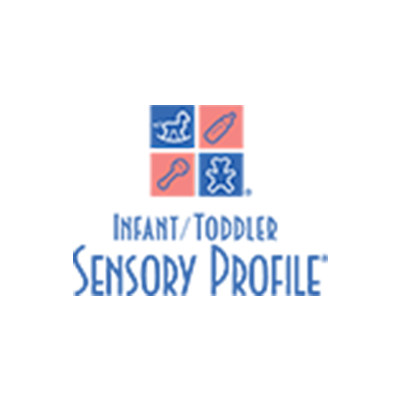Winnie Dunn, PhD, OTR, FAOTA
Overview:Examine patterns in young children who are at risk related to sensory processing
Age Range:Birth to 36 months
Completion Time:15 minutes
Norms:Standardized with 598 cases, 100 per age range
Publication Date:2002
The next version of the Sensory Profile 2 is now available. Read about the new Sensory Profile 2!
Your Scientifically-Based Choice
The Sensory Profile family of products includes the best-selling Sensory Profile, Infant/Toddler Sensory Profile, Adolescent/Adult Sensory Profile, and the Sensory Profile School Companion. The expansive age-range of Sensory Profile products allows you to confidently evaluate sensory-related difficulties in clients, from birth to geriatric.
Whatever the age of your clients — infants, child, adolescent, or adult — Sensory Profile products can help you:
- Understand the complexities of their sensory processing
- Gather critical sensory information related to home, school, and work
- Design strategies for managing daily life
- Build evidence in your practice
These unique instruments offer a research-based, family-centered approach to sensory processing and provide case studies and guide you in interpretation and intervention planning. For more information about how these assessments work together click here.
For further information about the administration, scoring, or interpretation, please click on the appropriate link below:
- Adolescent/Adult Sensory Profile
- Infant/Toddler Sensory Profile
- Sensory Profile
- Sensory Profile School Companion
Infant/Toddler Sensory Profile
The Infant/Toddler Sensory Profile was a developed to evaluate sensory processing patterns in the very young. The results provide you with the understanding of how sensory processing affects the child’s daily functioning performance.
Features & Benefits
- Provides a standard method for measuring an infant’s sensory processing abilities.
- Helps therapist, early childhood teachers, and parents profile the effect of sensory processing on functional performance in the daily life of the infant.
- Caregivers complete a judgment-based questionnaire, available in English or Spanish, reporting the frequency with which infants respond to various sensory experiences (Almost Always, Frequently, Occasionally, Seldom, or Almost Never.)
- Provides validated and reliable scores as well as interpretation of results and case studies for your review.
Areas of Assessment
Administration
Examine patterns in children from birth to 36 months who are at risk or have specific disabilities related to sensory processing abilities. Caregivers complete a judgment-based questionnaire in 15 minutes, available in either English or Spanish, reporting the frequency (Almost Always, Frequently, Occasionally, Seldom, or Almost Never) with which infants respond to various sensory experiences.
Standardization
Standardized with 589 cases (100 per age range), the Infant/Toddler Sensory Profile™ provides validated and reliable scores, as well as interpretation of results and case studies for your review.
Scoring
The Infant/Toddler Sensory Profile consists of 36 items for children birth to 6 months and 48 items for children 7 to 36 months. The caregiver questionnaire contains items divided into sensory systems. For children birth to 6 months, there are four quadrant scores and one combined quadrant score; for children 7 to 36 months, there are five sensory processing section scores, four quadrant scores, and one combined quadrant score available.
The quadrant scores reflect the child’s responsiveness to sensory experiences, and are based on Dunn’s Model of Sensory Processing. Sensation Seeking and Low Registration indicate different high threshold responses, while Sensory Sensitivity and Sensation Avoiding reflect different low threshold responses. Since the low threshold items are particularly relevant with some disability groups, we also provide a combined quadrant score (Low Threshold) that is the combination of Sensory Sensitivity and Sensation Avoiding quadrant scores.
The Sensory Processing scores for children 7 to 36 months indicate the child’s responses to the basic sensory systems. Although there are six sensory processing systems addressed in the questionnaire (i.e., General Processing, Auditory Processing, Visual Processing, Tactile Processing, Vestibular Processing, and Oral Sensory Processing), only five sensory processing systems for children 7 to 36 months have scores: Auditory Processing, Visual Processing, Tactile Processing, Vestibular Processing and Oral Sensory Processing.
Interpretation
Certain patterns of performance on the Infant/Toddler Sensory Profile are indicative of difficulties with sensory processing and performance. In these cases, the team serving the child follows up on the relationship between sensory processing and performance difficulties. Occupational therapists have expertise in sensory processing as part of their professional preparation. Other professionals can acquire this expertise through post-professional education.
Technical Characteristics
Gain an understanding of the developmental aspects including sampling structure, validity, and reliability by reviewing the Technical Report.
Reference Materials
Discover how a parent’s sensory ability can impact a child with Sensory Difficulties
Evaluate parents of a child or infant with sensory processing challenges with Adolescent/Adult Sensory Profile.
By profiling the parents for their sensory processing responses, you will gain valuable insights into the child’s interactions and help to build more family-centered intervention strategies.
See the benefits of having a parent of a child with sensory processing difficulties take the Adolescent/Adult Sensory Profile, by reading this real-world example, case study.
Questions
Frequently asked questions follow. Click on a question to see the response.
-
When should I use the Infant/Toddler Sensory Profile?
-
How does it meet IDEA ’97 mandates?
-
Is it appropriate to administer the Infant/Toddler Sensory Profile on a child with severe disabilities?





